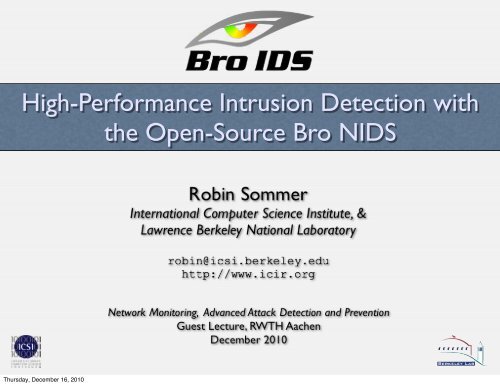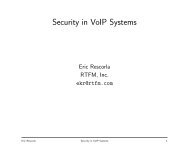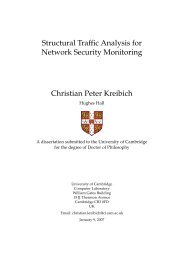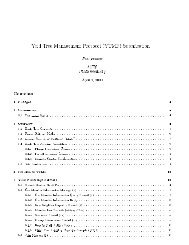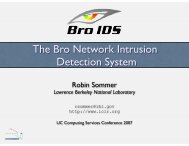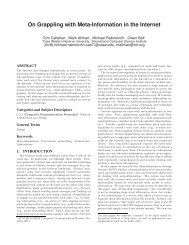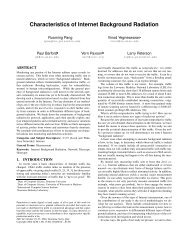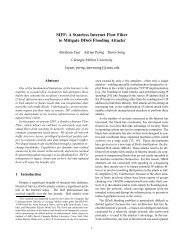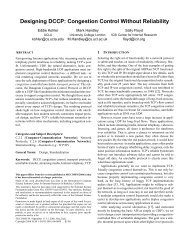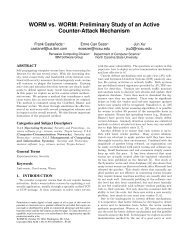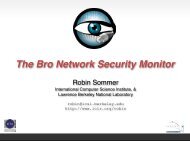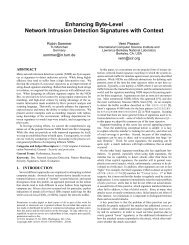High-Performance Intrusion Detection with the Open-Source Bro NIDS
High-Performance Intrusion Detection with the Open-Source Bro NIDS
High-Performance Intrusion Detection with the Open-Source Bro NIDS
Create successful ePaper yourself
Turn your PDF publications into a flip-book with our unique Google optimized e-Paper software.
<strong>High</strong>-<strong>Performance</strong> <strong>Intrusion</strong> <strong>Detection</strong> <strong>with</strong><br />
<strong>the</strong> <strong>Open</strong>-<strong>Source</strong> <strong>Bro</strong> <strong>NIDS</strong><br />
Thursday, December 16, 2010
Outline<br />
1. Overview of <strong>the</strong> <strong>Bro</strong> Network <strong>Intrusion</strong> <strong>Detection</strong> System<br />
• Philosophy<br />
• Deployment<br />
• Architecture and Usage<br />
• Specific Capability: Dynamic Protocol <strong>Detection</strong><br />
2. <strong>High</strong> <strong>Performance</strong> <strong>with</strong> Concurrent Traffic Analysis<br />
• Concurrency Potential<br />
• Coarse-grained Parallelism: A cluster for load-balancing<br />
• Fine-grained Parallelism: Designing a multi-threaded <strong>NIDS</strong><br />
3. Future Directions<br />
Guest Lecture, RWTH Aachen<br />
2<br />
Thursday, December 16, 2010
System Philosophy<br />
• <strong>Bro</strong> has been developed at LBNL & ICSI since 1996<br />
• Designed and originally developed by Vern Paxson, now at ICSI & UC Berkeley<br />
• <strong>Bro</strong> provides a real-time network analysis framework<br />
• Primary a network intrusion detection system (<strong>NIDS</strong>)<br />
• However it is also used for pure traffic analysis<br />
• Focus is on<br />
• Application-level semantic analysis (ra<strong>the</strong>r than analyzing individual packets)<br />
• Tracking information over time<br />
• Strong separation of mechanism and policy<br />
• The core of <strong>the</strong> system is policy-neutral (no notion of “good” or “bad”)<br />
• User provides local site policy<br />
Guest Lecture, RWTH Aachen<br />
3<br />
Thursday, December 16, 2010
System Philosophy (2)<br />
• Operators program <strong>the</strong>ir policy<br />
• Not really meaningful to talk about what <strong>Bro</strong> detects “by default”<br />
• Analysis model is not signature matching<br />
• <strong>Bro</strong> is fundamentally different from, e.g., Snort (though it can do signatures as well)<br />
• Analysis model is not anomaly detection<br />
• Though it does support such approaches (and o<strong>the</strong>rs) in principle<br />
• System thoroughly logs all activity<br />
• It does not just alert<br />
• Logs are invaluable for forensics<br />
Guest Lecture, RWTH Aachen<br />
4<br />
Thursday, December 16, 2010
Target Environments<br />
• <strong>Bro</strong> is specifically well-suited for scientific environments<br />
• Extremely useful in networks <strong>with</strong> liberal (“default allow”) policies<br />
• <strong>High</strong>-performance on commodity hardware<br />
• Supports intrusion prevention schemes<br />
• <strong>Open</strong>-source <strong>with</strong> a BSD license<br />
• It does however require some effort to use effectively<br />
• Pretty complex, script-based system<br />
• Requires understanding of <strong>the</strong> network<br />
• No GUI, just ASCII logs<br />
• Only partially documented<br />
• Have been lacking resources to fully polish <strong>the</strong> system<br />
• But: This is actually just changing; more later<br />
• Development has primarily been driven by research<br />
• However, our focus is operational use; we invest much time into “practical” issues<br />
• Want to bridge gap between research and operational deployment<br />
Guest Lecture, RWTH Aachen<br />
5<br />
Thursday, December 16, 2010
Installations<br />
Site<br />
Systems<br />
Berkeley National Laboratory 15,000<br />
Los Alamos<br />
1000s<br />
National Center for Atmospheric Research 6,500<br />
National Center for Supercomputing<br />
Applications<br />
5,000<br />
NERSC 5,000<br />
Pittsburgh Supercomputing Center 300<br />
UC Berkeley 100,000<br />
UC Riverside 10,000<br />
The Ohio State University 85,000<br />
... and many more in academia, government, and some in industry.<br />
Guest Lecture, RWTH Aachen<br />
6<br />
Thursday, December 16, 2010
Lawrence Berkeley National Lab<br />
• Main site located on a 200-acre area in <strong>the</strong> Berkeley hills<br />
• Close proximity to UC Berkeley<br />
LBNL<br />
Campus<br />
• LBNL has been using <strong>Bro</strong> operationally for >10 years<br />
• It is one of <strong>the</strong> main components of <strong>the</strong> lab’s network security infrastructure<br />
Guest Lecture, RWTH Aachen<br />
7<br />
Thursday, December 16, 2010
Lawrence Berkeley National Lab (2)<br />
• A Department of Energy National Lab<br />
• Former head, Stephen Chu, now leading Secretary of Energy<br />
• <strong>Open</strong>, unclassified research<br />
• Research is freely shared<br />
• Nanotechnology, Energy, Physics, Biology, Chemistry, Environmental, Computing<br />
• Diverse user community<br />
• Scientific facilities used by researchers around <strong>the</strong> world<br />
• Many users are transient and not employees<br />
• Many of <strong>the</strong> staff have dual appointments <strong>with</strong> UC Berkeley<br />
• Very liberal, default-allow security policy<br />
• Characteristic for many research environment, but makes monitoring challenging<br />
• Government-influenced thread-model<br />
Thursday, December 16, 2010<br />
Guest Lecture, RWTH Aachen
LBNL’s <strong>Bro</strong> Setup<br />
External<br />
10G<br />
Tap<br />
10G<br />
Internal<br />
(ESNet)<br />
(LBLNet)<br />
<strong>Bro</strong><br />
Guest Lecture, RWTH Aachen<br />
9<br />
Thursday, December 16, 2010
LBNL’s <strong>Bro</strong> Setup<br />
External<br />
10G<br />
Tap<br />
Gateway<br />
Tap<br />
10G<br />
Internal<br />
(ESNet)<br />
(LBLNet)<br />
<strong>Bro</strong><br />
<strong>Bro</strong><br />
Guest Lecture, RWTH Aachen<br />
9<br />
Thursday, December 16, 2010
LBNL’s <strong>Bro</strong> Setup<br />
External<br />
(ESNet)<br />
10G<br />
Tap<br />
Gateway<br />
Tap<br />
10G<br />
Internal<br />
(LBLNet)<br />
<strong>Bro</strong> <strong>Bro</strong> <strong>Bro</strong><br />
<strong>Bro</strong> <strong>Bro</strong><br />
<strong>Bro</strong><br />
Guest Lecture, RWTH Aachen<br />
9<br />
Thursday, December 16, 2010
LBNL’s <strong>Bro</strong> Setup<br />
External<br />
(ESNet)<br />
10G<br />
Tap<br />
Gateway<br />
Tap<br />
10G<br />
Internal<br />
(LBLNet)<br />
acld<br />
Dynamic<br />
Blocking<br />
<strong>Bro</strong> <strong>Bro</strong> <strong>Bro</strong><br />
<strong>Bro</strong> <strong>Bro</strong><br />
<strong>Bro</strong><br />
<strong>Bro</strong> blocks several thousands addresses per day!<br />
Guest Lecture, RWTH Aachen<br />
9<br />
Thursday, December 16, 2010
Activity Logs: Connections<br />
• One-line summaries for all TCP connections<br />
• Most basic, yet also one of <strong>the</strong> most useful analyzers<br />
> bro -i en0 tcp<br />
Time Duration <strong>Source</strong> Destination<br />
1144876596.658302 1.206521 192.150.186.169 62.26.220.2 \<br />
http 53052 80 tcp 874 1841 SF X<br />
Serv SrcPort DstPort Proto SrcBytes DstBytes State Dir<br />
LBNL has connection logs for every connection attempt since June 94!<br />
Guest Lecture, RWTH Aachen<br />
10<br />
Thursday, December 16, 2010
Activity Logs: HTTP Sessions<br />
1144876588.30 %2 start 192.150.186.169:53041 > 195.71.11.67:80<br />
1144876588.30 %2 GET /index.html (200 "OK" [57634] www.spiegel.de)<br />
1144876588.30 %2 > HOST: www.spiegel.de<br />
1144876588.30 %2 > USER-AGENT: Mozilla/5.0 (Macintosh; PPC Mac OS ...<br />
1144876588.30 %2 > ACCEPT: text/xml,application/xml,application/xhtml ...<br />
1144876588.30 %2 > ACCEPT-LANGUAGE: en-us,en;q=0.7,de;q=0.3<br />
[...]<br />
1144876588.77 %2 < SERVER: Apache/1.3.26 (Unix) mod_fastcgi/2.2.12<br />
1144876588.77 %2 < CACHE-CONTROL: max-age=120<br />
1144876588.77 %2 < EXPIRES: Wed, 12 Apr 2006 21:18:28 GMT<br />
[...]<br />
1144876588.77 %2
Architecture<br />
Packets<br />
Network<br />
Guest Lecture, RWTH Aachen<br />
12<br />
Thursday, December 16, 2010
Architecture<br />
Events<br />
Packet Analysis<br />
Event Engine<br />
Packets<br />
Network<br />
Guest Lecture, RWTH Aachen<br />
12<br />
Thursday, December 16, 2010
Architecture<br />
Notification<br />
<strong>Detection</strong> Logic<br />
Policy Script Interpreter<br />
Events<br />
Packet Analysis<br />
Event Engine<br />
Packets<br />
Network<br />
Guest Lecture, RWTH Aachen<br />
12<br />
Thursday, December 16, 2010
Communication Architecture<br />
<strong>Bro</strong> A<br />
<strong>Bro</strong> B<br />
Notification<br />
Policy Script<br />
Interpreter<br />
Events<br />
Event Engine<br />
Packets<br />
Network<br />
Guest Lecture, RWTH Aachen<br />
13<br />
Thursday, December 16, 2010
Communication Architecture<br />
<strong>Bro</strong> A<br />
<strong>Bro</strong> B<br />
Notification<br />
Notification<br />
Policy Script<br />
Interpreter<br />
Policy Script<br />
Interpreter<br />
Events<br />
Events<br />
Event Engine<br />
Event Engine<br />
Packets<br />
Packets<br />
Network<br />
Network<br />
Guest Lecture, RWTH Aachen<br />
13<br />
Thursday, December 16, 2010
Communication Architecture<br />
<strong>Bro</strong> A<br />
<strong>Bro</strong> B<br />
Notification<br />
Notification<br />
Policy Script<br />
Interpreter<br />
State Operations<br />
Policy Script<br />
Interpreter<br />
Events<br />
Event Stream<br />
Events<br />
Event Engine<br />
Event Engine<br />
Packets<br />
Packets<br />
Network<br />
Network<br />
Guest Lecture, RWTH Aachen<br />
13<br />
Thursday, December 16, 2010
Event Model<br />
Web<br />
Client<br />
1.2.3.4/4321<br />
Request for /index.html<br />
Status OK plus data<br />
Web<br />
Server<br />
5.6.7.8/80<br />
Guest Lecture, RWTH Aachen<br />
14<br />
Thursday, December 16, 2010
Event Model<br />
Web<br />
Client<br />
1.2.3.4/4321<br />
...<br />
Stream of TCP packets<br />
Request for /index.html<br />
Status OK plus data<br />
SYN SYN ACK ACK ACK ACK FIN FIN<br />
...<br />
Web<br />
Server<br />
5.6.7.8/80<br />
Guest Lecture, RWTH Aachen<br />
14<br />
Thursday, December 16, 2010
Event Model<br />
Web<br />
Client<br />
1.2.3.4/4321<br />
...<br />
Stream of TCP packets<br />
Request for /index.html<br />
Status OK plus data<br />
SYN SYN ACK ACK ACK ACK FIN FIN<br />
...<br />
Web<br />
Server<br />
5.6.7.8/80<br />
Event<br />
connection_established(1.2.3.4/43215.6.7.8/80)<br />
Guest Lecture, RWTH Aachen<br />
14<br />
Thursday, December 16, 2010
Event Model<br />
Web<br />
Client<br />
1.2.3.4/4321<br />
...<br />
Stream of TCP packets<br />
Request for /index.html<br />
Status OK plus data<br />
SYN SYN ACK ACK ACK ACK FIN FIN<br />
...<br />
Web<br />
Server<br />
5.6.7.8/80<br />
Event<br />
connection_established(1.2.3.4/43215.6.7.8/80)<br />
TCP stream reassembly for originator<br />
Event<br />
http_request(1.2.3.4/43215.6.7.8/80, “GET”, “/index.html”)<br />
Guest Lecture, RWTH Aachen<br />
14<br />
Thursday, December 16, 2010
Event Model<br />
Web<br />
Client<br />
1.2.3.4/4321<br />
...<br />
Stream of TCP packets<br />
Request for /index.html<br />
Status OK plus data<br />
SYN SYN ACK ACK ACK ACK FIN FIN<br />
...<br />
Web<br />
Server<br />
5.6.7.8/80<br />
Event<br />
connection_established(1.2.3.4/43215.6.7.8/80)<br />
TCP stream reassembly for originator<br />
Event<br />
http_request(1.2.3.4/43215.6.7.8/80, “GET”, “/index.html”)<br />
TCP stream reassembly for responder<br />
Event<br />
http_reply(1.2.3.4/43215.6.7.8/80, 200, “OK”, data)<br />
Guest Lecture, RWTH Aachen<br />
14<br />
Thursday, December 16, 2010
Event Model<br />
Web<br />
Client<br />
1.2.3.4/4321<br />
...<br />
Stream of TCP packets<br />
Request for /index.html<br />
Status OK plus data<br />
SYN SYN ACK ACK ACK ACK FIN FIN<br />
...<br />
Web<br />
Server<br />
5.6.7.8/80<br />
Event<br />
connection_established(1.2.3.4/43215.6.7.8/80)<br />
TCP stream reassembly for originator<br />
Event<br />
http_request(1.2.3.4/43215.6.7.8/80, “GET”, “/index.html”)<br />
TCP stream reassembly for responder<br />
Event<br />
http_reply(1.2.3.4/43215.6.7.8/80, 200, “OK”, data)<br />
Event<br />
connection_finished(1.2.3.4/4321, 5.6.7.8/80)<br />
Guest Lecture, RWTH Aachen<br />
14<br />
Thursday, December 16, 2010
Event-Engine<br />
• Event-engine is written in C++<br />
• Performs policy-neutral analysis<br />
• Turns low-level activity into high-level events<br />
• Examples: connection_established, http_request<br />
• Events are annotated <strong>with</strong> context (e.g., IP addresses, URL)<br />
• Contains analyzers for >30 protocols, including<br />
• ARP, IP, ICMP, TCP, UDP<br />
• DCE-RPC, DNS, FTP, Finger, Gnutella, HTTP, IRC, Ident,<br />
NCP, NFS, NTP, NetBIOS, POP3, Portmapper, RPC,<br />
Rsh, Rlogin, SMB, SMTP, SSH, SSL, SunRPC, Telnet<br />
• Analyzers generate ~300 types of events<br />
Guest Lecture, RWTH Aachen<br />
15<br />
Thursday, December 16, 2010
Policy Scripts<br />
• Scripts process event stream, incorporating ...<br />
• ... context from past events<br />
• ... site’s local security policy<br />
• Scripts take actions<br />
• Generating alerts via syslog or mail<br />
• Executing program as a form of response<br />
• Recording activity to disk<br />
Guest Lecture, RWTH Aachen<br />
16<br />
Thursday, December 16, 2010
Script Example: Tracking SSH Hosts<br />
global ssh_hosts: set[addr];<br />
event connection_established(c: connection)<br />
{<br />
local responder = c.id.resp_h; # Responder’s address<br />
local service = c.id.resp_p; # Responder’s port<br />
if ( service != 22/tcp )<br />
return; # Not SSH.<br />
if ( responder in ssh_hosts )<br />
return; # We already know this one.<br />
add ssh_hosts[responder]; # Found a new host.<br />
alarm fmt("New SSH host found: %s", responder);<br />
}<br />
Guest Lecture, RWTH Aachen<br />
17<br />
Thursday, December 16, 2010
Expressing Policy<br />
• Custom, domain-specific language<br />
• <strong>Bro</strong> ships <strong>with</strong> 20K+ lines of script code<br />
• Default scripts detect attacks & log activity extensively<br />
• Language is<br />
• Procedural<br />
• Event-based<br />
• Strongly typed<br />
• Rich in types<br />
• Usual script-language types, such as tables and sets<br />
• Domain-specific types, such as addresses, ports, subnets<br />
• Supporting state management (expiration, timers, etc.)<br />
• Supporting communication <strong>with</strong> o<strong>the</strong>r <strong>Bro</strong> instances<br />
Guest Lecture, RWTH Aachen<br />
18<br />
Thursday, December 16, 2010
Port-based Analysis<br />
• <strong>Bro</strong> has lots of application-layer analyzers<br />
• But which protocol does a connection use?<br />
• Traditionally <strong>NIDS</strong> rely on ports<br />
• Port 80? Oh, that’s HTTP.<br />
• Obviously deficient in two ways<br />
• There’s non-HTTP traffic on port 80 (firewalls tend to open this port...)<br />
• There’s HTTP on ports o<strong>the</strong>r than port 80<br />
• Particularly problematic for security monitoring<br />
• Want to know if somebody avoids <strong>the</strong> well-known port<br />
Guest Lecture, RWTH Aachen<br />
19<br />
Thursday, December 16, 2010
Dynamic Protocol <strong>Detection</strong><br />
Web<br />
Client<br />
Request for /index.html<br />
Web<br />
Server<br />
1.2.3.4/4321 5.6.7.8/80<br />
Guest Lecture, RWTH Aachen<br />
20<br />
Thursday, December 16, 2010
Dynamic Protocol <strong>Detection</strong><br />
Web<br />
Client<br />
Request for /index.html<br />
Web<br />
Server<br />
1.2.3.4/4321 5.6.7.8/80<br />
GET /index.html HTTP/1.1\nServer: ...<br />
Guest Lecture, RWTH Aachen<br />
20<br />
Thursday, December 16, 2010
Dynamic Protocol <strong>Detection</strong><br />
Web<br />
Client<br />
Request for /index.html<br />
Web<br />
Server<br />
1.2.3.4/4321 5.6.7.8/80<br />
Port 80?<br />
Method Path Version Header<br />
HTTP<br />
GET /index.html HTTP/1.1\nServer: ...<br />
http_request<br />
Guest Lecture, RWTH Aachen<br />
20<br />
Thursday, December 16, 2010
Dynamic Protocol <strong>Detection</strong><br />
Web<br />
Client<br />
Request for /index.html<br />
Web<br />
Server<br />
1.2.3.4/4321 5.6.7.8/80<br />
Port 80?<br />
HTTP<br />
Method Path Version Header<br />
GET /index.html HTTP/1.1\nServer: ...<br />
If it parses right<br />
http_request<br />
Guest Lecture, RWTH Aachen<br />
20<br />
Thursday, December 16, 2010
Dynamic Protocol <strong>Detection</strong><br />
Web<br />
Client<br />
Request for /index.html<br />
Web<br />
Server<br />
1.2.3.4/4321 5.6.7.8/80<br />
Port 80?<br />
HTTP<br />
Method Path Version Header<br />
GET /index.html HTTP/1.1\nServer: ...<br />
If it parses right<br />
http_request<br />
SSH<br />
Version<br />
SSH-.-<br />
???<br />
Guest Lecture, RWTH Aachen<br />
20<br />
Thursday, December 16, 2010
Dynamic Protocol <strong>Detection</strong><br />
Web<br />
Client<br />
Request for /index.html<br />
Web<br />
Server<br />
1.2.3.4/4321 5.6.7.8/80<br />
Port 80?<br />
HTTP<br />
Method Path Version Header<br />
GET /index.html HTTP/1.1\nServer: ...<br />
If it parses right<br />
http_request<br />
SSH<br />
Version<br />
???<br />
Not SSH<br />
SSH-.-<br />
Guest Lecture, RWTH Aachen<br />
20<br />
Thursday, December 16, 2010
Dynamic Protocol <strong>Detection</strong><br />
Web<br />
Client<br />
Request for /index.html<br />
Web<br />
Server<br />
1.2.3.4/4321 5.6.7.8/80<br />
Port 80?<br />
HTTP<br />
Method Path Version Header<br />
GET /index.html HTTP/1.1\nServer: ...<br />
If it parses right<br />
http_request<br />
SSH<br />
Version<br />
???<br />
Not SSH<br />
SSH-.-<br />
FTP<br />
SMTP<br />
IRC<br />
???<br />
???<br />
???<br />
Guest Lecture, RWTH Aachen<br />
20<br />
Thursday, December 16, 2010
Dynamic Protocol <strong>Detection</strong><br />
Web<br />
Client<br />
Request for /index.html<br />
Web<br />
Server<br />
1.2.3.4/4321 5.6.7.8/80<br />
Port 80?<br />
HTTP<br />
Method Path Version Header<br />
GET<br />
/index.html HTTP/1.1\nServer: ...<br />
If it parses right<br />
http_request<br />
SSH<br />
FTP<br />
SMTP<br />
IRC<br />
Version<br />
SSH-.-<br />
???<br />
???<br />
???<br />
???<br />
Not SSH<br />
Optimization: Pattern matching<br />
for finding candidates<br />
Guest Lecture, RWTH Aachen<br />
20<br />
Thursday, December 16, 2010
Dynamic Protocol <strong>Detection</strong><br />
Web<br />
Client<br />
Request for /index.html<br />
Web<br />
Server<br />
1.2.3.4/4321 5.6.7.8/80<br />
Port 80?<br />
HTTP<br />
Method Path Version Header<br />
GET<br />
/index.html HTTP/1.1\nServer: ...<br />
If it parses right<br />
http_request<br />
SSH<br />
FTP<br />
SMTP<br />
IRC<br />
Version<br />
SSH-.-<br />
???<br />
???<br />
???<br />
???<br />
Not SSH<br />
Dynamic Protocol <strong>Detection</strong>:<br />
1. Identify potential analyzers<br />
2. Verify decision by parsing<br />
Optimization: Pattern matching<br />
for finding candidates<br />
Guest Lecture, RWTH Aachen<br />
20<br />
Thursday, December 16, 2010
Analyzer Trees<br />
IP<br />
TCP<br />
SMTP<br />
Interact.<br />
IMAP<br />
POP3<br />
Guest Lecture, RWTH Aachen<br />
21<br />
Thursday, December 16, 2010
Ano<strong>the</strong>r Application: FTP Data<br />
xxx.xxx.xxx.xxx/2373 > xxx.xxx.xxx.xxx/5560 start<br />
response (220 Rooted Moron Version 1.00 4 WinSock ready...)<br />
USER ops (logged in)<br />
SYST (215 UNIX Type: L8)<br />
[...]<br />
LIST -al (complete)<br />
TYPE I (ok)<br />
SIZE stargate.atl.s02e18.hdtv.xvid-tvd.avi (unavail)<br />
PORT xxx,xxx,xxx,xxx,xxx,xxx (ok)<br />
STOR stargate.atl.s02e18.hdtv.xvid-tvd.avi, NOOP (ok)<br />
ftp-data video/x-msvideo `RIFF (little-endian) data, AVI'<br />
[...]<br />
response (226 Transfer complete.)<br />
[...]<br />
QUIT (closed)<br />
Guest Lecture, RWTH Aachen<br />
22<br />
Thursday, December 16, 2010
<strong>High</strong> <strong>Performance</strong> <strong>with</strong><br />
Concurrent Traffic Analysis<br />
Guest Lecture, RWTH Aachen<br />
23<br />
Thursday, December 16, 2010
Development of Internet Traffic<br />
TBytes/month<br />
0 50 100 150 200 250 300 350 400<br />
Munich Total Scientific bytes Network<br />
3 major universities, 10GE upstream<br />
Incoming bytes<br />
~100,000 Users<br />
~65,000 Hosts<br />
Total upstream bytes<br />
Incoming bytes<br />
1996 1998 2000 2002 2004 2006 2008<br />
Guest Lecture, RWTH Aachen<br />
Data: Leibniz-Rechenzentrum, München<br />
24<br />
Thursday, December 16, 2010
Internet Traffic: Connections<br />
#connections/month<br />
0M 200M 400M 600M 800M 1000M 1300M<br />
Lawrence Berkeley National Lab<br />
Medium-sized, 10GE upstream<br />
~ 5,000 Users<br />
~15,000 Hosts<br />
Total connections<br />
1994 1996 1998 2000 2002 2004 2006 2008<br />
Guest Lecture, RWTH Aachen<br />
Data: Lawrence Berkeley National Lab<br />
25<br />
Thursday, December 16, 2010
Internet Traffic: Connections<br />
#connections/month<br />
0M 200M 400M 600M 800M 1000M 1300M<br />
Lawrence Berkeley National Lab<br />
Medium-sized, 10GE upstream<br />
~ 5,000 Users<br />
~15,000 Hosts<br />
Total connections<br />
Successful connections<br />
Attempted connections<br />
1994 1996 1998 2000 2002 2004 2006 2008<br />
Guest Lecture, RWTH Aachen<br />
Data: Lawrence Berkeley National Lab<br />
25<br />
Thursday, December 16, 2010
Internet Traffic: Connections<br />
#connections/month<br />
0M 200M 400M 600M 800M 1000M 1300M<br />
Lawrence Berkeley National Lab<br />
Medium-sized, 10GE upstream<br />
~ 5,000 Users<br />
~15,000 Hosts<br />
Total connections<br />
Successful connections<br />
Attempted connections<br />
Nimda<br />
CodeRed2<br />
CodeRed<br />
Slapper<br />
Sobig.F<br />
Welchia<br />
Mydoom.O<br />
Blaster<br />
Sasser<br />
Santy<br />
Conficker.B<br />
Conficker.A<br />
1994 1996 1998 2000 2002 2004 2006 2008<br />
Guest Lecture, RWTH Aachen<br />
Data: Lawrence Berkeley National Lab<br />
25<br />
Thursday, December 16, 2010
Need for <strong>Performance</strong><br />
• Keep needing to do more analysis on more data at higher speeds<br />
• <strong>NIDS</strong> used to run successfully on commodity hardware<br />
• In particular important for open-source <strong>NIDS</strong> (e.g., Snort, <strong>Bro</strong>)<br />
• Not any more!<br />
• Moore’s law doesn’t hold for single-core performance anymore<br />
• Unfortunately, today’s <strong>NIDS</strong> implementations are single-threaded and thus limited<br />
• To overcome, we can<br />
• Significantly restrict <strong>the</strong> amount of analysis, or<br />
• Turn to expensive & inflexible custom hardware, or<br />
• Parallelize processing to leverage commodity multi-core architectures<br />
• Parallelizing an application is inherently domain-specific<br />
• There’s no generic approach to concurrency<br />
• Need examine carefully where <strong>the</strong> concurrency potential is that we can exploit<br />
Guest Lecture, RWTH Aachen<br />
26<br />
Thursday, December 16, 2010
Outline<br />
1. Overview of <strong>the</strong> <strong>Bro</strong> Network <strong>Intrusion</strong> <strong>Detection</strong> System<br />
• Philosophy<br />
• Deployment<br />
• Architecture and Usage<br />
• Specific Capability: Dynamic Protocol <strong>Detection</strong><br />
2. <strong>High</strong> <strong>Performance</strong> <strong>with</strong> Concurrent Traffic Analysis<br />
• Concurrency Potential<br />
• Coarse-grained Parallelism: A cluster for load-balancing<br />
• Fine-grained Parallelism: Designing a multi-threaded <strong>NIDS</strong><br />
3. Future Directions<br />
Guest Lecture, RWTH Aachen<br />
27<br />
Thursday, December 16, 2010
Concurrency Potential<br />
Guest Lecture, RWTH Aachen<br />
28<br />
Thursday, December 16, 2010
Traffic Analysis Pipeline<br />
Packet Analysis<br />
10Gbps<br />
Packet Demultiplexer<br />
…<br />
Packets<br />
Packet<br />
Flows<br />
Protocol<br />
Analyzers<br />
Activity<br />
Events<br />
Concurrent Instances<br />
~10 4 ~10 5 ~10 4<br />
Guest Lecture, RWTH Aachen<br />
29<br />
Thursday, December 16, 2010
Traffic Analysis Pipeline<br />
Packet Analysis<br />
<strong>Detection</strong> Logic<br />
10Gbps<br />
Packet Demultiplexer<br />
…<br />
Per<br />
Flow<br />
Per<br />
Aggreg.<br />
Global<br />
Packets<br />
Packet<br />
Flows<br />
Protocol<br />
Analyzers<br />
Activity<br />
Events<br />
Filtered<br />
Events<br />
Fur<strong>the</strong>r Filtered<br />
Events<br />
Concurrent Instances<br />
~10 4 ~10 5 ~10 4 ~10 3 ~10-100<br />
Guest Lecture, RWTH Aachen<br />
29<br />
Thursday, December 16, 2010
Traffic Analysis Pipeline<br />
Packet Analysis<br />
<strong>Detection</strong> Logic<br />
10Gbps<br />
Packet Demultiplexer<br />
…<br />
Per<br />
Flow<br />
Per<br />
Aggreg.<br />
Global<br />
Packets<br />
Packet<br />
Flows<br />
Protocol<br />
Analyzers<br />
Activity<br />
Events<br />
Filtered<br />
Events<br />
Fur<strong>the</strong>r Filtered<br />
Events<br />
Concurrent Instances<br />
~10 4 ~10 5<br />
~10 4 ~10 3 ~10-100<br />
Guest Lecture, RWTH Aachen<br />
30<br />
Thursday, December 16, 2010
Traffic Analysis Pipeline<br />
Packet Analysis<br />
<strong>Detection</strong> Logic<br />
10Gbps<br />
Packet Demultiplexer<br />
…<br />
Per<br />
Flow<br />
Per<br />
Aggreg.<br />
Global<br />
Packets<br />
Packet<br />
Flows<br />
Stateless<br />
Protocol<br />
Analyzers<br />
Activity<br />
Events<br />
Filtered<br />
Events<br />
Fur<strong>the</strong>r Filtered<br />
Events<br />
Concurrent Instances<br />
~10 4 ~10 5<br />
~10 4 ~10 3 ~10-100<br />
Guest Lecture, RWTH Aachen<br />
30<br />
Thursday, December 16, 2010
Traffic Analysis Pipeline<br />
Packet Analysis<br />
<strong>Detection</strong> Logic<br />
10Gbps<br />
Packet Demultiplexer<br />
…<br />
Per<br />
Flow<br />
Per<br />
Aggreg.<br />
Global<br />
Packets<br />
Packet<br />
Flows<br />
Stateless<br />
Protocol<br />
Analyzers<br />
Activity<br />
Events<br />
Per-flow<br />
Filtered<br />
Events<br />
Fur<strong>the</strong>r Filtered<br />
Events<br />
Concurrent Instances<br />
~10 4 ~10 5<br />
state<br />
~10 4 ~10 3 ~10-100<br />
Guest Lecture, RWTH Aachen<br />
30<br />
Thursday, December 16, 2010
Traffic Analysis Pipeline<br />
Packet Analysis<br />
<strong>Detection</strong> Logic<br />
10Gbps<br />
Packet Demultiplexer<br />
…<br />
Per<br />
Flow<br />
Per<br />
Aggreg.<br />
Global<br />
Packets<br />
Concurrent Instances<br />
Packet<br />
Flows<br />
Stateless<br />
Protocol<br />
Analyzers<br />
~10 4 ~10 5<br />
Activity<br />
Events<br />
Per-flow<br />
state<br />
Filtered<br />
Events<br />
Inter-flow<br />
Fur<strong>the</strong>r Filtered<br />
Events<br />
state<br />
~10 4 ~10 3 ~10-100<br />
Guest Lecture, RWTH Aachen<br />
30<br />
Thursday, December 16, 2010
Building a Concurrent <strong>NIDS</strong><br />
• Can <strong>Bro</strong> exploit <strong>the</strong> concurrency of <strong>the</strong> pipeline?<br />
• Currently single-threaded.<br />
• Talking about 160K lines of C++ code, plus ano<strong>the</strong>r 25K lines of script code<br />
• Two strategies:<br />
• Coarse-grained parallelism: The <strong>Bro</strong> Cluster<br />
• Fine-grained parallelism: Multi-core <strong>Bro</strong><br />
Guest Lecture, RWTH Aachen<br />
31<br />
Thursday, December 16, 2010
Coarse-grained Parallelism<br />
The <strong>Bro</strong> Cluster<br />
Guest Lecture, RWTH Aachen<br />
32<br />
Thursday, December 16, 2010
Load-Balancer Approach<br />
<strong>NIDS</strong><br />
10Gbps<br />
Demux<br />
Protocol<br />
Flow<br />
Aggreg.<br />
Global<br />
Packet Analysis<br />
<strong>Detection</strong> Logic<br />
Guest Lecture, RWTH Aachen<br />
33<br />
Thursday, December 16, 2010
Demux<br />
Demux<br />
Demux<br />
Protocol<br />
Protocol<br />
Protocol<br />
Flow<br />
Flow<br />
Flow<br />
Aggreg.<br />
Aggreg.<br />
Aggreg.<br />
Global<br />
Global<br />
Global<br />
Load-Balancer Approach<br />
<strong>NIDS</strong> 1<br />
Packet Analysis<br />
<strong>Detection</strong> Logic<br />
<strong>NIDS</strong> 2<br />
10Gbps<br />
Packet Analysis<br />
<strong>Detection</strong> Logic<br />
<strong>NIDS</strong> 3<br />
Packet Analysis<br />
<strong>Detection</strong> Logic<br />
Guest Lecture, RWTH Aachen<br />
33<br />
Thursday, December 16, 2010
External Packet Demultiplexer<br />
Demux<br />
Demux<br />
Demux<br />
Protocol<br />
Protocol<br />
Protocol<br />
Flow<br />
Flow<br />
Flow<br />
Aggreg.<br />
Aggreg.<br />
Aggreg.<br />
Global<br />
Global<br />
Global<br />
Load-Balancer Approach<br />
Flow<br />
Packets<br />
<strong>NIDS</strong> 1<br />
Packet Analysis<br />
<strong>Detection</strong> Logic<br />
<strong>NIDS</strong> 2<br />
10Gbps<br />
Packet Analysis<br />
<strong>Detection</strong> Logic<br />
<strong>NIDS</strong> 3<br />
Packet Analysis<br />
<strong>Detection</strong> Logic<br />
Guest Lecture, RWTH Aachen<br />
33<br />
Thursday, December 16, 2010
External Packet Demultiplexer<br />
Demux<br />
Demux<br />
Demux<br />
Protocol<br />
Protocol<br />
Protocol<br />
Flow<br />
Flow<br />
Flow<br />
Aggreg.<br />
Aggreg.<br />
Aggreg.<br />
Global<br />
Global<br />
Global<br />
Load-Balancer Approach<br />
Flow<br />
Packets<br />
<strong>NIDS</strong> 1<br />
Packet Analysis<br />
<strong>NIDS</strong> 2<br />
<strong>Detection</strong> Logic<br />
Communication<br />
10Gbps<br />
Packet Analysis<br />
<strong>NIDS</strong> 3<br />
<strong>Detection</strong> Logic<br />
Communication<br />
Packet Analysis<br />
<strong>Detection</strong> Logic<br />
Guest Lecture, RWTH Aachen<br />
33<br />
Thursday, December 16, 2010
The <strong>Bro</strong> Cluster<br />
There are a number of practical challenges:<br />
• Communication capability required<br />
Fortunately, <strong>Bro</strong> has communication primitives built-in<br />
• Management of multi-machine setup is tedious<br />
Build a management interface transparently hiding <strong>the</strong> complexity for <strong>the</strong> operator<br />
• External demultiplexer needs to operate at line-rate<br />
Worked <strong>with</strong> a vendor to build an appliance implementing our dispatching scheme<br />
Guest Lecture, RWTH Aachen<br />
34<br />
Thursday, December 16, 2010
External Packet Dispatcher<br />
• How to decide where to send a packet?<br />
• We want <strong>the</strong> dispatcher to<br />
• Keep flows toge<strong>the</strong>r<br />
• Be simple and stateless for implementation in hardware<br />
• Observation: Each packet contains a flow identifier<br />
• 4-tuple of IP addresses and TCP/UDP port numbers<br />
• Dispatcher can calculate hash over <strong>the</strong> 4-tuple<br />
• backend := hash(tuple) mod N<br />
• But how smooth a distribution does that yield?<br />
Guest Lecture, RWTH Aachen<br />
35<br />
Thursday, December 16, 2010
Simulation of Packet Dispatcher<br />
!"#$%&'((")"$*"+%,+-%","$%&'+.)'/0.'1$%234<br />
5 6 75 76 85<br />
=&6<<br />
/>(<<br />
md5-conn<br />
/>(
Simulation of Packet Dispatcher<br />
!"#$%&'((")"$*"+%,+-%","$%&'+.)'/0.'1$%234<br />
5 6 75 76 85<br />
=&6<<br />
/>(<<br />
md5-conn<br />
/>(
cFlow: A Production Load-Balancer<br />
• LBNL worked <strong>with</strong> cPacket Networks<br />
• cFlow: 10GE line-rate, stand-alone load-balancer<br />
• 10GE in/out<br />
• Web & CLI<br />
• Filtering capabilities<br />
• Available from cPacket<br />
Guest Lecture, RWTH Aachen<br />
37<br />
Thursday, December 16, 2010
Cluster Installations<br />
• Lawrence Berkeley National Lab<br />
• Medium-sized network, 15,000 hosts, 10Gbps upstream, 500-1000Mb/sec.<br />
• Two operational clusters at LBNL w/ 15 backends, replacing Labs’ monitoring<br />
• We are operating a research <strong>Bro</strong> cluster <strong>with</strong> 12 individual PCs.<br />
• UC Berkeley Campus<br />
• Large-scale network, 100,000 hosts, 2x10Gbps upstream, 2-3Gb/sec.<br />
• Just started to operate a new research cluster, <strong>with</strong> 30 individual machines.<br />
• Funded by NSF’s Computing Research Infrastructure program.<br />
• Fur<strong>the</strong>r cluster installations in operation or planing.<br />
Guest Lecture, RWTH Aachen<br />
38<br />
Thursday, December 16, 2010
UC Berkeley Cluster<br />
Monitored/generated traffic at 10GE<br />
blade0-13<br />
Upstream<br />
Monitored traffic at 1GE<br />
Control Network at 1GE<br />
OTP Gateway<br />
Backup<br />
redspot.berkeley.edu<br />
128.32.53.143<br />
redspot<br />
OTP Gateway<br />
Linux<br />
... ...<br />
Blade Set 1<br />
Blade Set 2<br />
blade14-27<br />
RSA SecurID<br />
Appliance<br />
secureid<br />
cflow<br />
homer<br />
GigaLINK<br />
cFlow<br />
Primary<br />
cFlow<br />
Backup<br />
Splitter<br />
Port Mirror CX4<br />
Port Mirror SR<br />
SR<br />
A4<br />
A1<br />
A3<br />
HP Switch<br />
Server 1<br />
Primary <strong>NIDS</strong> Master<br />
A2<br />
switch<br />
marge<br />
CX4<br />
Media<br />
Converter<br />
Cluster Server<br />
NFS, NIS, DHCP, etc.<br />
SR<br />
RAID<br />
bart<br />
Splitter<br />
Server 2<br />
Secondary <strong>NIDS</strong> Master<br />
lisa<br />
Server 3<br />
Linux<br />
tilera<br />
Guest Lecture, RWTH Aachen<br />
Tilera Box<br />
Linux<br />
39<br />
Thursday, December 16, 2010
UC Berkeley Cluster<br />
Monitored/generated traffic at 10GE<br />
blade0-13<br />
Upstream<br />
Monitored traffic at 1GE<br />
Control Network at 1GE<br />
OTP Gateway<br />
Backup<br />
redspot.berkeley.edu<br />
128.32.53.143<br />
redspot<br />
OTP Gateway<br />
Linux<br />
... ...<br />
Blade Set 1<br />
Blade Set 2<br />
blade14-27<br />
RSA SecurID<br />
Appliance<br />
secureid<br />
cflow<br />
homer<br />
GigaLINK<br />
cFlow<br />
Primary<br />
cFlow<br />
Backup<br />
Splitter<br />
Port Mirror CX4<br />
Port Mirror SR<br />
SR<br />
A4<br />
A1<br />
A3<br />
HP Switch<br />
Server 1<br />
Primary <strong>NIDS</strong> Master<br />
A2<br />
switch<br />
marge<br />
CX4<br />
Media<br />
Converter<br />
Cluster Server<br />
NFS, NIS, DHCP, etc.<br />
SR<br />
RAID<br />
bart<br />
Splitter<br />
Server 2<br />
Secondary <strong>NIDS</strong> Master<br />
lisa<br />
Server 3<br />
Linux<br />
tilera<br />
Guest Lecture, RWTH Aachen<br />
Tilera Box<br />
Linux<br />
39<br />
Thursday, December 16, 2010
UC Berkeley Cluster<br />
Monitored/generated traffic at 10GE<br />
blade0-13<br />
Upstream<br />
Monitored traffic at 1GE<br />
Control Network at 1GE<br />
OTP Gateway<br />
Backup<br />
redspot.berkeley.edu<br />
128.32.53.143<br />
redspot<br />
OTP Gateway<br />
Linux<br />
... ...<br />
Blade Set 1<br />
Blade Set 2<br />
blade14-27<br />
RSA SecurID<br />
Appliance<br />
secureid<br />
cflow<br />
homer<br />
GigaLINK<br />
cFlow<br />
Primary<br />
cFlow<br />
Backup<br />
Splitter<br />
Port Mirror CX4<br />
Port Mirror SR<br />
SR<br />
A4<br />
A1<br />
A3<br />
HP Switch<br />
Server 1<br />
Primary <strong>NIDS</strong> Master<br />
A2<br />
switch<br />
marge<br />
CX4<br />
Media<br />
Converter<br />
Cluster Server<br />
NFS, NIS, DHCP, etc.<br />
SR<br />
RAID<br />
bart<br />
Splitter<br />
Server 2<br />
Secondary <strong>NIDS</strong> Master<br />
lisa<br />
Server 3<br />
Linux<br />
tilera<br />
Guest Lecture, RWTH Aachen<br />
Tilera Box<br />
Linux<br />
39<br />
Thursday, December 16, 2010
UC Berkeley Cluster<br />
Monitored/generated traffic at 10GE<br />
blade0-13<br />
Upstream<br />
Monitored traffic at 1GE<br />
Control Network at 1GE<br />
OTP Gateway<br />
Backup<br />
redspot.berkeley.edu<br />
128.32.53.143<br />
redspot<br />
OTP Gateway<br />
Linux<br />
... ...<br />
Blade Set 1<br />
Blade Set 2<br />
blade14-27<br />
RSA SecurID<br />
Appliance<br />
secureid<br />
cflow<br />
homer<br />
GigaLINK<br />
cFlow<br />
Primary<br />
cFlow<br />
Backup<br />
Splitter<br />
Port Mirror CX4<br />
Port Mirror SR<br />
SR<br />
A4<br />
A1<br />
A3<br />
HP Switch<br />
Server 1<br />
Primary <strong>NIDS</strong> Master<br />
A2<br />
switch<br />
marge<br />
CX4<br />
Media<br />
Converter<br />
Cluster Server<br />
NFS, NIS, DHCP, etc.<br />
SR<br />
RAID<br />
bart<br />
Splitter<br />
Server 2<br />
Secondary <strong>NIDS</strong> Master<br />
lisa<br />
Server 3<br />
Linux<br />
tilera<br />
Guest Lecture, RWTH Aachen<br />
Tilera Box<br />
Linux<br />
39<br />
Thursday, December 16, 2010
Extensions<br />
100GE(!) version is in planing ...<br />
Guest Lecture, RWTH Aachen<br />
40<br />
Thursday, December 16, 2010
Fine-grained Parallelism<br />
Building a Multi-Threaded <strong>NIDS</strong><br />
Guest Lecture, RWTH Aachen<br />
41<br />
Thursday, December 16, 2010
“Real” Multi-Core <strong>NIDS</strong><br />
• Cluster has short-comings:<br />
• Chances are that today’s backends have multiple cores, which will be wasted<br />
• State is unnecessarily duplicated across all backends<br />
• Communication introduces race-conditions<br />
• Setup requires quite a bit of effort (and money)<br />
• What we really want is a multi-threaded <strong>NIDS</strong><br />
• ... and we want it to scale well <strong>with</strong> increasing numbers of cores<br />
• Still don’t want to write a new <strong>NIDS</strong> from scratch<br />
• Turn <strong>the</strong> traditional <strong>Bro</strong> into a multi-threaded application<br />
• Main objective is doing that transparently:<br />
• Do not expose parallel processing to <strong>the</strong> operator<br />
• But parallelize internally “under <strong>the</strong> hood”<br />
Guest Lecture, RWTH Aachen<br />
42<br />
Thursday, December 16, 2010
<strong>Bro</strong>’s Architecture<br />
Notification<br />
<strong>Detection</strong> Logic<br />
Policy Script Interpreter<br />
Events<br />
Packet Analysis<br />
Event Engine<br />
Packets<br />
Network<br />
Guest Lecture, RWTH Aachen<br />
43<br />
Thursday, December 16, 2010
<strong>Bro</strong>’s Architecture<br />
Notification<br />
Single Thread<br />
<strong>Detection</strong> Logic<br />
Policy Script Interpreter<br />
Events<br />
Packet Analysis<br />
Event Engine<br />
Packets<br />
Network<br />
Guest Lecture, RWTH Aachen<br />
43<br />
Thursday, December 16, 2010
<strong>Bro</strong>’s Architecture<br />
Notification<br />
<strong>Detection</strong> Logic<br />
Policy Script Interpreter<br />
Script Threads<br />
Events<br />
Packet Analysis<br />
Event Engine<br />
Event Engine<br />
Threads<br />
Packets Dispatcher<br />
Packet Dispatcher Thread<br />
Network<br />
Guest Lecture, RWTH Aachen<br />
44<br />
Thursday, December 16, 2010
<strong>Bro</strong>’s Architecture<br />
Notification<br />
<strong>Detection</strong> Logic<br />
Policy Script Interpreter<br />
Script Threads<br />
Events<br />
Packet Analysis<br />
Event Engine<br />
Event Engine<br />
Threads<br />
“Cluster in a Box”<br />
Packets Dispatcher<br />
Packet Dispatcher Thread<br />
Network<br />
Guest Lecture, RWTH Aachen<br />
44<br />
Thursday, December 16, 2010
<strong>Bro</strong>’s Architecture<br />
How to parallelize<br />
a scripting language?<br />
Notification<br />
<strong>Detection</strong> Logic<br />
Policy Script Interpreter<br />
Script Threads<br />
Events<br />
Packet Analysis<br />
“Cluster in a Box”<br />
Event Engine<br />
Packets Dispatcher<br />
Event Engine<br />
Threads<br />
Packet Dispatcher Thread<br />
Network<br />
Guest Lecture, RWTH Aachen<br />
44<br />
Thursday, December 16, 2010
Script Example: Matching URLs<br />
Task: Report all Web requests for files called “passwd”.<br />
event http_request(c: connection, method: string, path: string)<br />
{<br />
if ( method == “GET” && path == /.*passwd/ )<br />
NOTICE(SensitiveURL, c, path); # Alarm.<br />
}<br />
(Syntax simplified.)<br />
Example: http_request(1.2.3.4/43215.6.7.8/80, “GET”, “/index.html”)<br />
Guest Lecture, RWTH Aachen<br />
45<br />
Thursday, December 16, 2010
Script Example 2: Flow-based<br />
Task: Report all successful HTTP requests for files called “passwd”.<br />
global potentially_sensitive: table[connection] of string;<br />
event http_request(c: connection, method: string, path: string)<br />
{<br />
if ( method == “GET” && path == /.*passwd/ )<br />
potentially_sensitive[c] = path; # Add to table.<br />
}<br />
event http_reply(c: connection, response: int, reason: string) )<br />
{<br />
if ( response == OK && c in potentially_sensitive )<br />
NOTICE(SensitiveURL, c, potentially_sensitive[c]);<br />
}<br />
(Syntax simplified.)<br />
Guest Lecture, RWTH Aachen<br />
46<br />
Thursday, December 16, 2010
Script Example 3: Aggregated<br />
Task: Count failed connection attempts per source address.<br />
global attempts: table[addr] of int &default=0;<br />
event connection_rejected(c: connection)<br />
{<br />
local source = c.orig_h; ! # Get source address.<br />
local n = ++attempts[source];! # Increase counter.<br />
if ( n == SOME_THRESHOLD ) ! # Check for threshold.<br />
NOTICE(Scanner, source); ! # If so, report.<br />
}<br />
(Syntax simplified.)<br />
Guest Lecture, RWTH Aachen<br />
47<br />
Thursday, December 16, 2010
“Scheduling Scopes”<br />
• Accessing a piece of state from only one thread buys us:<br />
• Lock-free memory accesses<br />
• Preservation of temporal order of event execution<br />
• We add <strong>the</strong> concept of scopes to <strong>Bro</strong>’s script language:<br />
• For each variable, one specifies <strong>the</strong> semantic granularity of accesses<br />
(e.g., connection, originator, responder, host pair)<br />
• All accesses <strong>with</strong> <strong>the</strong> same underlying unit will come from <strong>the</strong> same thread.<br />
• Internally, we keep thread-local versions of each variable<br />
• For each event handler, <strong>Bro</strong> derives a scope based on which variables it accesses<br />
• When it is scheduled, <strong>the</strong> scope & current unit determine which thread it goes to<br />
global potentially_sensitive: table[connection] of string<br />
! &scope=connection;<br />
global attempts: table[addr] of int &default=0<br />
! &scope=originator;<br />
Guest Lecture, RWTH Aachen<br />
48<br />
Thursday, December 16, 2010
Parallel Event Scheduling<br />
Threaded Policy Script Interpreter<br />
Thread<br />
1<br />
Thread<br />
2<br />
Thread<br />
3<br />
Thread<br />
4<br />
…<br />
Thread<br />
n<br />
Queue<br />
Queue<br />
Queue<br />
Queue<br />
Queue<br />
Queue<br />
Conn A<br />
http_request<br />
Guest Lecture, RWTH Aachen<br />
49<br />
Thursday, December 16, 2010
Parallel Event Scheduling<br />
Threaded Policy Script Interpreter<br />
Thread<br />
1<br />
Thread<br />
2<br />
Thread<br />
3<br />
Thread<br />
4<br />
…<br />
Thread<br />
n<br />
Queue<br />
Queue<br />
Queue<br />
Queue<br />
Queue<br />
Queue<br />
Conn A<br />
http_request<br />
http_reply<br />
Conn A<br />
Guest Lecture, RWTH Aachen<br />
49<br />
Thursday, December 16, 2010
Parallel Event Scheduling<br />
Threaded Policy Script Interpreter<br />
Thread<br />
1<br />
Thread<br />
2<br />
Thread<br />
3<br />
Thread<br />
4<br />
…<br />
Thread<br />
n<br />
Queue<br />
Queue<br />
Queue<br />
Queue<br />
Queue<br />
Queue<br />
Conn A<br />
http_request<br />
http_reply<br />
Conn A<br />
Conn B<br />
http_request<br />
Guest Lecture, RWTH Aachen<br />
49<br />
Thursday, December 16, 2010
Parallel Event Scheduling<br />
Threaded Policy Script Interpreter<br />
Thread<br />
1<br />
Thread<br />
2<br />
Thread<br />
3<br />
Thread<br />
4<br />
…<br />
Thread<br />
n<br />
Queue<br />
Queue<br />
Queue<br />
Queue<br />
Queue<br />
Queue<br />
Conn A<br />
Conn A<br />
Conn B<br />
Orig X<br />
http_request<br />
http_reply<br />
http_request<br />
conn_rejected<br />
Guest Lecture, RWTH Aachen<br />
49<br />
Thursday, December 16, 2010
Parallel Event Scheduling<br />
Threaded Policy Script Interpreter<br />
Thread<br />
1<br />
Thread<br />
2<br />
Thread<br />
3<br />
Thread<br />
4<br />
…<br />
Thread<br />
n<br />
Queue<br />
Queue<br />
Queue<br />
Queue<br />
Queue<br />
Queue<br />
Conn A<br />
Conn A<br />
Conn B<br />
Orig X<br />
Orig Y<br />
http_request<br />
http_reply<br />
http_request<br />
conn_rejected<br />
conn_rejected<br />
Guest Lecture, RWTH Aachen<br />
49<br />
Thursday, December 16, 2010
Parallel Event Scheduling<br />
Threaded Policy Script Interpreter<br />
Thread<br />
1<br />
Thread<br />
2<br />
Thread<br />
3<br />
Thread<br />
4<br />
…<br />
Thread<br />
n<br />
Queue<br />
Queue<br />
Queue<br />
Queue<br />
Queue<br />
Queue<br />
Conn A<br />
Conn A<br />
Conn B<br />
Orig X<br />
Orig Y<br />
Orig X<br />
http_request<br />
http_reply<br />
http_request<br />
conn_rejected<br />
conn_rejected<br />
conn_rejected<br />
Guest Lecture, RWTH Aachen<br />
49<br />
Thursday, December 16, 2010
Parallel Event Scheduling<br />
Threaded Policy Script Interpreter<br />
Thread<br />
1<br />
Thread<br />
2<br />
Thread<br />
3<br />
Thread<br />
4<br />
…<br />
Thread<br />
n<br />
Queue<br />
Queue<br />
Queue<br />
Queue<br />
Queue<br />
Queue<br />
Conn A<br />
Conn A<br />
Conn B<br />
Orig X<br />
Orig Y<br />
Orig X<br />
Conn B<br />
http_request<br />
http_reply<br />
http_request<br />
conn_rejected<br />
conn_rejected<br />
conn_rejected<br />
http_reply<br />
Guest Lecture, RWTH Aachen<br />
49<br />
Thursday, December 16, 2010
Parallel Event Scheduling<br />
Threaded Policy Script Interpreter<br />
Thread<br />
1<br />
Thread<br />
2<br />
Thread<br />
3<br />
Thread<br />
4<br />
…<br />
Thread<br />
n<br />
Queue<br />
Queue<br />
Queue<br />
Queue<br />
Queue<br />
Queue<br />
Conn A<br />
Conn A<br />
Conn B<br />
Orig X<br />
Orig Y<br />
Orig X<br />
Conn B<br />
Conn A<br />
http_request<br />
http_reply<br />
http_request<br />
conn_rejected<br />
conn_rejected<br />
conn_rejected<br />
http_reply<br />
http_request<br />
Guest Lecture, RWTH Aachen<br />
49<br />
Thursday, December 16, 2010
Implementation of Multi-Core <strong>Bro</strong><br />
• We have a prototype that we are now profiling fur<strong>the</strong>r<br />
• Parallelization based on Intel’s Threading Building Blocks<br />
• We do not use TBB’s task concept; just a portable thread abstraction<br />
• Spent a lot of time in making <strong>Bro</strong>’s code thread-safe<br />
• Extensive use of globals and statics ...<br />
• Race conditions, e.g., in memory management<br />
• Added lots of debugging code<br />
• Not pretty ...<br />
• Assigned scopes to <strong>the</strong> most important script globals<br />
• Profiling showed which global variables are accessed <strong>the</strong> most (>100)<br />
• Surprisingly many are covered <strong>with</strong> a small set of scopes<br />
• Some minor script adaptations to observe scoping rules<br />
• “Real” globals are fully locked<br />
Guest Lecture, RWTH Aachen<br />
50<br />
Thursday, December 16, 2010
Event Engine <strong>Performance</strong> So Far ...<br />
Time Units<br />
25000<br />
18750<br />
12500<br />
6250<br />
No packet processing<br />
Full packet processing; events discarded.<br />
0<br />
0 1 2 3 4 5<br />
# Event Engine Threads<br />
Dual quad-core Xeon system <strong>with</strong> 10min/11GB of LBL traffic<br />
1 script-engine thread<br />
Guest Lecture, RWTH Aachen<br />
51<br />
Thursday, December 16, 2010
Script-Engine <strong>Performance</strong> So Far ...<br />
60000<br />
45000<br />
No packet processing<br />
Full packet processing; events discarded.<br />
Full event processing<br />
Time Units<br />
30000<br />
15000<br />
0<br />
0 1 2 3 4<br />
# Script-engine Threads<br />
Dual quad-core Xeon system <strong>with</strong> 10min/11GB of LBL traffic<br />
2 event-engine threads<br />
Guest Lecture, RWTH Aachen<br />
52<br />
Thursday, December 16, 2010
Future Directions<br />
Guest Lecture, RWTH Aachen<br />
53<br />
Thursday, December 16, 2010
Outline<br />
1. Overview of <strong>the</strong> <strong>Bro</strong> Network <strong>Intrusion</strong> <strong>Detection</strong> System<br />
• Philosophy<br />
• Deployment<br />
• Architecture and Usage<br />
• Specific Capability: Dynamic Protocol <strong>Detection</strong><br />
2. <strong>High</strong> <strong>Performance</strong> <strong>with</strong> Concurrent Traffic Analysis<br />
• Concurrency Potential<br />
• Coarse-grained Parallelism: A cluster for load-balancing<br />
• Fine-grained Parallelism: Designing a multi-threaded <strong>NIDS</strong><br />
3. Future Directions<br />
Guest Lecture, RWTH Aachen<br />
54<br />
Thursday, December 16, 2010
Understanding <strong>the</strong> Bottlenecks<br />
• Concurrent execution is just <strong>the</strong> start<br />
• “Just” parallelizing execution does not necessarily yield <strong>the</strong> expected speed-up<br />
• Extensive profiling and optimization<br />
• CPU usage<br />
• Impact of <strong>the</strong> memory hierarchy<br />
• Explore different scheduling strategies<br />
• Use well-defined input traffic to understand <strong>the</strong> effects.<br />
• Offline vs. online<br />
• Evaluation on different hardware platforms<br />
• Commodity systems <strong>with</strong> dual quad-core Xeons (54xx vs. 55xx)<br />
• 64-core Tilera platform<br />
• Simics simulator to explore a wide variety of options<br />
•<br />
Parallelizing <strong>the</strong> packet dispatcher<br />
• Several vendors provides platforms that directly schedule packets to threads<br />
• Tilera can do that as well<br />
Guest Lecture, RWTH Aachen<br />
55<br />
Thursday, December 16, 2010
Automating <strong>the</strong> Scoping<br />
• Scopes are assigned manually in our prototype<br />
• Not ideal, as it’s not completely transparent to <strong>the</strong> user<br />
• <strong>Bro</strong> should be able to infer scopes automatcially<br />
• Static and dynamic analysis of access patterns<br />
• Scoping rules require minor script modifications<br />
• Likewise, <strong>Bro</strong> could rewrite code internally<br />
• For example, auto-split event handlers<br />
Guest Lecture, RWTH Aachen<br />
56<br />
Thursday, December 16, 2010
Building an Abstract Machine<br />
• Working on an abstract machine for traffic analysis<br />
• Instruction set <strong>with</strong> domain-specific support for typical operations<br />
• Compiler to turn it into highly efficient native code<br />
• Developing a concurrency abstraction<br />
• Large set of very light-weight threads, plus execution context<br />
• Will work well for <strong>the</strong> scoping model<br />
• Eventually, <strong>Bro</strong> scripts will be compiled into this execution model<br />
• Avoids having to deal <strong>with</strong> all <strong>the</strong> low-level concurrency in C++<br />
• HILTI: A <strong>High</strong>-level Intermediary Language for Traffic Analysis<br />
• Leveraging LLVM as <strong>the</strong> backend for code generation<br />
• Prototype exists<br />
Guest Lecture, RWTH Aachen<br />
57<br />
Thursday, December 16, 2010
Software Development Support<br />
• <strong>Bro</strong> has been lacking resources for “polishing”<br />
• Primarily funded by research grants<br />
• Maintenance, support & documentation<br />
• Now, NSF has awarded ICSI funding for development<br />
• Three full-time engineers/programmers<br />
• Collaboration <strong>with</strong> National Center for Supercomputing Applications (NCSA)<br />
• Allows to address areas where <strong>Bro</strong> needs work<br />
• User experience<br />
• <strong>Performance</strong><br />
Guest Lecture, RWTH Aachen<br />
58<br />
Thursday, December 16, 2010
Target: Blue Waters<br />
One of <strong>the</strong> most powerful supercomputers,<br />
being built at <strong>the</strong> National Center for Supercomputing Applications (NCSA)<br />
10 PF/s peak performance<br />
>300,000 cores<br />
>1 PetaByte memory<br />
>10 Petabyte disk storage<br />
>0.5 Exabyte archival storage<br />
>1 PF/s sustained on applications<br />
Hosted in 88,000-square-foot facility<br />
Guest Lecture, RWTH Aachen<br />
59<br />
Thursday, December 16, 2010
Conclusion<br />
Guest Lecture, RWTH Aachen<br />
60<br />
Thursday, December 16, 2010
The <strong>Bro</strong> <strong>NIDS</strong><br />
• Powerful, open-source system<br />
• Fundamentally more powerful than <strong>the</strong> “classic” <strong>NIDS</strong><br />
• Bridges <strong>the</strong> gap between academia and operations<br />
• <strong>Performance</strong> is one of <strong>the</strong> main challenges<br />
• Load-balancing approach is working today<br />
• Multi-threading on <strong>the</strong> radar, but challenging<br />
• The “<strong>Bro</strong> World” is moving quickly right now<br />
• NSF support for software development, outside of research grants<br />
• <strong>Open</strong>-source, and help is always welcome!<br />
• Student projects are available in many areas ...<br />
Guest Lecture, RWTH Aachen<br />
61<br />
Thursday, December 16, 2010
Thanks for your attention.<br />
Robin Sommer<br />
International Computer Science Institute, &<br />
Lawrence Berkeley National Laboratory<br />
robin@icsi.berkeley.edu<br />
http://www.icir.org<br />
Thursday, December 16, 2010
Work Plan<br />
Documentation and Support<br />
Reliability and Sustainability<br />
<strong>Performance</strong><br />
Data Analysis<br />
Milestones<br />
Quarter<br />
Documentation<br />
Packaging & Installation<br />
Configuration Tools<br />
<strong>Detection</strong> Capabilities<br />
Community Portal<br />
Community Events<br />
User Support<br />
Bugs and o<strong>the</strong>r Inconveniences<br />
Quality Assurance<br />
Modernizing Code Base<br />
Multi-threaded Implementation<br />
Script Compiler<br />
Interactive Analysis Tool<br />
Database Interface<br />
<strong>Bro</strong> 1.6 <strong>Bro</strong> 1.7 <strong>Bro</strong> 2.0<br />
Year 1 Year 2 Year 3<br />
1 2 3 4 5 6 7 8 9 10 11 12<br />
P P P P P P<br />
D D D D D D<br />
S S S S S S S S S S S S<br />
D<br />
D<br />
Results<br />
Comprehensive manuals for <strong>Bro</strong> 1.6+;<br />
procedures for keeping <strong>the</strong>m current.<br />
Linux RPMs; FreeBSD port; live CD;<br />
modernized build infrastructure.<br />
D D D D Configuration “Wizards”.<br />
S S S S S S S S<br />
D D D D D D D D D D D D<br />
S S S S S S S S S S S S<br />
P P P P P P<br />
New policy scripts detecting recent<br />
attack vectors.<br />
Public, web-based portal for exchange of<br />
experiences and functionality.<br />
D D D D D D <strong>Bro</strong> workshops and user meetings.<br />
S S S S S S<br />
S S S S S S S S S S S S<br />
S S S S<br />
D D D D<br />
D D D D<br />
D<br />
D<br />
P P P P<br />
D D D D D D D<br />
P<br />
P<br />
D D D D D<br />
P P P<br />
D D D D<br />
P<br />
P<br />
D D D D<br />
Dedicated contact person for <strong>Bro</strong><br />
deployments.<br />
Issue tracker tickets addressed; code<br />
analysis of core components.<br />
Comprehensive test-suite; automated<br />
cross-platform builds/tests via NMI.<br />
Consistent code base; unified analysis<br />
output; removal of obsolete code.<br />
Multi-threaded <strong>Bro</strong> implementation able<br />
to exploit modern many-core platforms.<br />
Compiler translating <strong>Bro</strong> scripts into<br />
native code for <strong>the</strong> target platform.<br />
<strong>High</strong>ly interactive graphical analysis tool<br />
for incident analysis and response.<br />
Transparent database interface for <strong>Bro</strong>’s<br />
scripting language.<br />
Roles<br />
Principal Investigators Developers User Support<br />
63<br />
Thursday, December 16, 2010
Going Back in Time <strong>with</strong> <strong>the</strong><br />
Time Machine<br />
Guest Lecture, RWTH Aachen<br />
64<br />
Thursday, December 16, 2010
The Utility of Time Travel<br />
• <strong>Bro</strong>’s policy-neutral logs are often <strong>the</strong> most useful output<br />
• Typically we do not know in advance how <strong>the</strong> next attacks looks like<br />
• But when an incident occurred, we need to understand exactly what happened<br />
“How did <strong>the</strong> attacker get in? What damage did he do? Did <strong>the</strong> guy access o<strong>the</strong>r hosts as<br />
well? How can we detect similar activity in <strong>the</strong> future?”<br />
• This is when you need all information you can find<br />
• The most comprehensive resource are packet traces<br />
• Wouldn’t it be cool if you had a packet trace of that incident?<br />
Guest Lecture, RWTH Aachen<br />
65<br />
Thursday, December 16, 2010
The Time Machine<br />
• The Time Machine, a bulk-recorder for network traffic<br />
• Efficient packet recorder for high-volume network streams<br />
• Taps into a network link and records packets in <strong>the</strong>ir entirety<br />
• Provides efficient query interface to retrieve past traffic<br />
• Storing everything is obviously not feasible<br />
• TM uses heuristics for volume reduction<br />
• Cut-off: <br />
• Expiration: <br />
For each connection, TM stores only <strong>the</strong> first few KB<br />
Once space is exhausted, TM expires oldest packets automatically<br />
• Simple yet very effective scheme<br />
• Leverages network traffic’s “heavy-tails”<br />
• Even in large networks we can go back in time for several days<br />
• Proven to be extremely valuable for network forensics in operational use at LBL<br />
Guest Lecture, RWTH Aachen<br />
66<br />
Thursday, December 16, 2010
Example: Retension Time at LBNL<br />
retention time [days]<br />
0 5 10 15<br />
15KB cut-off,<br />
500GB disk buffer<br />
Retension time > 15 days<br />
Volume reduction > 97%<br />
Fri<br />
Sat<br />
Sun<br />
Mon<br />
Tue<br />
Wed<br />
Thu<br />
Fri<br />
Sat<br />
Sun<br />
Mon<br />
Tue<br />
Wed<br />
Thu<br />
Fri<br />
Sat<br />
Sun<br />
Mon<br />
Tue<br />
Wed<br />
Thu<br />
Fri<br />
Sat<br />
Sun<br />
Mon<br />
Tue<br />
Time<br />
10Gbps upstream link, 10,000 hosts, 100-200Mbps average, 1-2TB/day<br />
Guest Lecture, RWTH Aachen<br />
67<br />
Thursday, December 16, 2010
Query Interface<br />
• Interactive console interface<br />
# An example query. Results are stored in a file.<br />
query to_file "trace.pcap" index ip "1.2.3.4"<br />
# Dynamic class. All traffic of IP 5.6.7.8 is<br />
# assigned to class alarm<br />
set_dyn_class 5.6.7.8 alarm<br />
• Command-line client for common queries<br />
tm-query --ip 1.2.3.4 localhost host.pcap --time 12h<br />
Guest Lecture, RWTH Aachen<br />
68<br />
Thursday, December 16, 2010
Interfacing <strong>the</strong> TM <strong>with</strong> <strong>Bro</strong><br />
• The Time Machine can provide a <strong>NIDS</strong> <strong>with</strong> historic traffic<br />
Internal<br />
Network<br />
Tap<br />
Internet<br />
<strong>NIDS</strong><br />
Queries<br />
Traffic from<br />
<strong>the</strong> past<br />
Time<br />
Machine<br />
• Applications<br />
• <strong>Bro</strong> controls <strong>the</strong> TM (change cut-offs, switch storage class)<br />
• <strong>Bro</strong> permanently stores attack traffic<br />
• <strong>Bro</strong> analyzes traffic retrospectively<br />
Guest Lecture, RWTH Aachen<br />
69<br />
Thursday, December 16, 2010
Augmenting <strong>Bro</strong> Alerts <strong>with</strong> Traffic<br />
Guest Lecture, RWTH Aachen<br />
70<br />
Thursday, December 16, 2010
Current Work: “Time Machine NG”<br />
• We are now building a generalized Time Machine<br />
• Incorporates arbitrary network activity ra<strong>the</strong>r than just packets<br />
• Allows live queries for future activity<br />
Server IDS Router Desktop<br />
"Who accessed system X<br />
and also fetched URL Y?"<br />
Time-Machine<br />
Analyst<br />
One goal: Facilitate cross-site information sharing<br />
Guest Lecture, RWTH Aachen<br />
71<br />
Thursday, December 16, 2010
Multi-Core <strong>Bro</strong> Data Flow<br />
Main Thread<br />
Packets drive time<br />
class Thread<br />
Network Time<br />
Timer Manager<br />
Event Processor<br />
class EventManager<br />
QueueEvent()<br />
Events drive time<br />
Script Threads 1 ... n<br />
class Thread<br />
Network Time<br />
Timer Manager<br />
Event Processor<br />
class PacketManager<br />
Packets drive time<br />
Connection Threads 1 ...m<br />
class Thread<br />
Network Time<br />
Timer Manager<br />
Packets<br />
QueuePacket()<br />
Packet Processor<br />
Guest Lecture, RWTH Aachen<br />
class TimerMgr<br />
Synchronized<br />
Timer Manager<br />
Slowest thread drives time<br />
72<br />
Thursday, December 16, 2010


